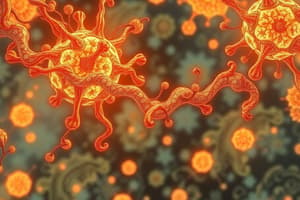Podcast
Questions and Answers
What is the primary function of enzymes in the cell?
What is the primary function of enzymes in the cell?
- To store genetic information
- To act as biological catalysts that speed up chemical reactions (correct)
- To physically change the structure of substrates
- To produce energy for the cell
What term describes the complete set of metabolic reactions in a cell?
What term describes the complete set of metabolic reactions in a cell?
- Homeostasis
- Metabolism (correct)
- Catabolism
- Anabolism
Which factor primarily determines the optimum reaction rate for enzymes in the human body?
Which factor primarily determines the optimum reaction rate for enzymes in the human body?
- Substrate concentration
- pH level
- Enzyme concentration
- Temperature (correct)
What happens to the reaction rate when the concentration of enzyme or substrate is increased?
What happens to the reaction rate when the concentration of enzyme or substrate is increased?
What is the role of extracellular enzymes in digestion?
What is the role of extracellular enzymes in digestion?
Flashcards
Enzymes
Enzymes
Proteins that act as biological catalysts, speeding up chemical reactions in cells without being consumed or changed.
Metabolic Reactions
Metabolic Reactions
The chemical reactions that occur within a cell.
Extracellular Enzymes
Extracellular Enzymes
Enzymes that work outside of cells, like those in the intestine that break down food.
Intracellular Enzymes
Intracellular Enzymes
Signup and view all the flashcards
Optimum Temperature
Optimum Temperature
Signup and view all the flashcards
Study Notes
Enzymes: Controlling Reactions in the Cell
- Chemical reactions in a cell are called metabolic reactions
- Metabolic reactions are controlled by enzymes
- Enzymes are proteins that act as biological catalysts
- Catalysts speed up reactions without being used up
- Enzymes take part in reactions, but are not changed afterwards
- Cells contain many different enzymes, each for a specific reaction
- Enzymes' function is to catalyse metabolic reactions
- Enzyme activity is controlled by genes in the nucleus
- Organisms maintain a relatively stable internal temperature (e.g., 37°C in humans) which speeds up reactions by using enzymes
Factors Affecting Enzymes
- Temperature:
- Optimum temperature is the best temperature for a reaction
- Higher temperatures increase kinetic energy, increasing collisions between molecules leading to a faster reaction
- However, too high temperatures can denature enzymes (causing a loss of shape and function).
- Substrate Concentration:
- Increasing substrate concentration increases the rate of reaction up to a certain point.
- Enzyme Concentration:
- Increasing enzyme concentration increases the rate of reaction proportionally, up to a certain point.
- pH:
- Enzymes have optimal pH ranges
- Extreme pH values can denature enzymes.
How Enzymes Work
- Enzymes have an active site
- The substrate molecule attaches to the enzyme's active site
- The reaction takes place which converts substrate into products
- The products leave the active site
- Enzymes fit into substrate molecules like a lock and key
- This makes enzymes specific (they only work on specific substrates)
Studying That Suits You
Use AI to generate personalized quizzes and flashcards to suit your learning preferences.





